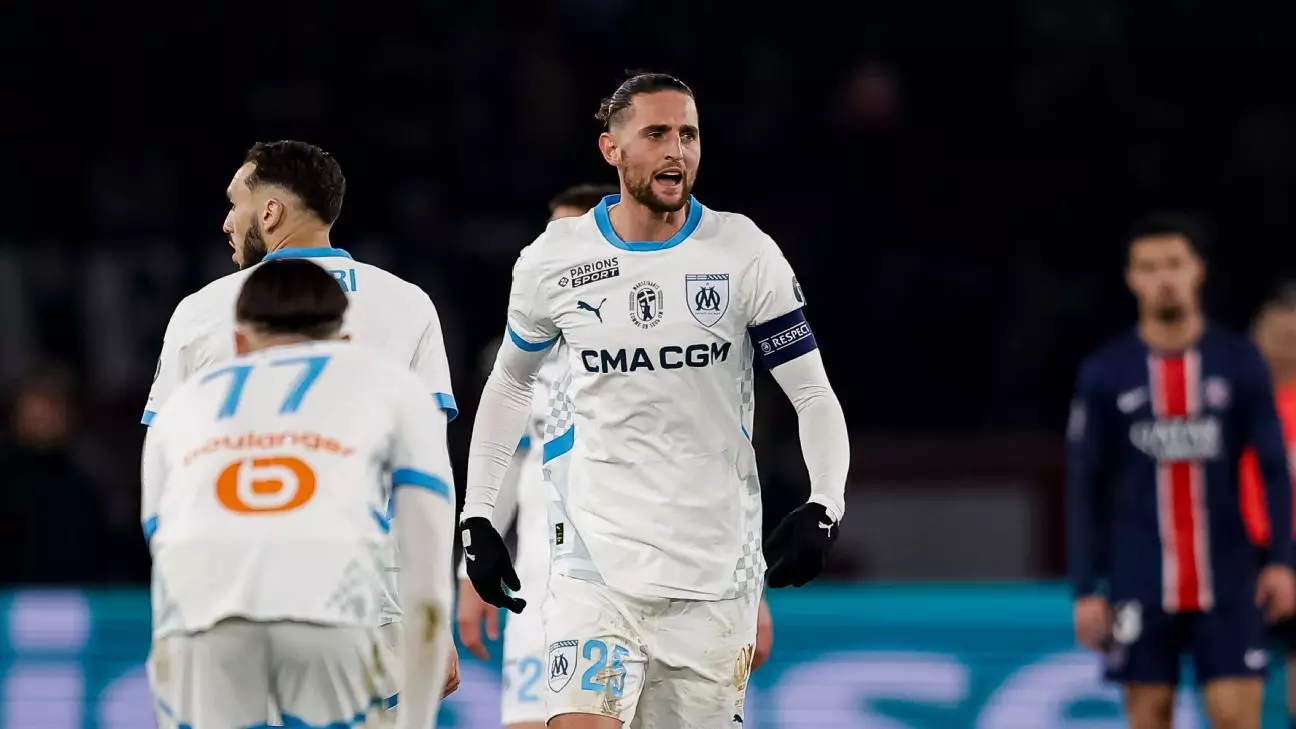In the heart of French football, a fierce rivalry has captivated audiences for decades: the competition between Marseille and Paris Saint-Germain (PSG). This intense rivalry, steeped in history and passion, reached new heights following a recent encounter that saw PSG clinch a 3-1 victory over Marseille. However, the aftermath wasn’t solely about football; it exposed deep-seated issues of class, identity, and the toxic elements that sometimes intrude upon the beautiful game.
Adrien Rabiot, once a prodigy in the PSG ranks and currently a standout midfielder for Marseille, found himself at the center of controversy following the match. After experiencing a hostile reception primarily marked by vitriolic insults from PSG fans, Rabiot took to social media to assert, “You can’t buy class.” This statement is much more than a retort; it shines a spotlight on the crass behavior that sometimes overshadows sportsmanship. Rabiot’s words are poignant, particularly in an era where the financial clout of clubs like PSG raises questions about the moral compass of sporting culture.
The Disturbing Atmosphere: Racism and Homophobia in Stadiums
The match between Marseille and PSG was marred not just by a defeat; it was tainted by deeply troubling anti-gay chants and racist slogans hurled at players and fans alike. The atmosphere at the Parc des Princes, filled with raucous PSG supporters, took a decidedly dark turn. Rabiot’s experience serves as a microcosm of a broader societal issue in football: the pervasive nature of discrimination within the sport. The chants, which explicitly targeted Marseille supporters, showcased a damaging culture endemic to rivalries, particularly when mixed with regional animosities and economic disparities.
It is telling that Rabiot’s mother, Véronique, expressed outrage over the incident, questioning the inaction of match officials in the face of discriminatory behavior. “I don’t understand why the match wasn’t stopped,” she stated, reflecting a collective frustration that resonates with many within and outside the world of football. The apparent double standards in enforcement, especially regarding homophobic remarks, are alarming and warrant serious scrutiny. How can officials confidently officiate a game while turning a blind eye to hate-filled rhetoric that violates the very spirit of sports?
Official Response: Accountability and Reform Needed
Despite existing regulations that grant referees the authority to halt games due to anti-gay or racist chants, the enforcement remains painfully inconsistent. Many question the efficacy of the French league’s action plan, which allows spectators to report misconduct. Incidents like the one during the PSG-Marseille match illustrate a critical flaw in both policy and implementation. What is needed is not merely a framework for reporting abuse but a culture of accountability—a shift that recognizes the urgency of creating a safe environment for all fans, regardless of their background or sexual orientation.
Organizations such as Rouge Direct have sprung into action, demanding that governing bodies take decisive action against racist and homophobic chanting. The campaign’s call for punitive measures against offending clubs is an important step in fostering a more respectful atmosphere within stadiums, thereby emphasizing that such behavior is unacceptable in any capacity.
Broader Implications for French Football
The events that unfolded on that day are not just an isolated incident; they are part of a troubling pattern that reflects larger societal issues in France. Discrimination based on race and sexuality is insidious, and football often acts as a stage where these prejudices are magnified. The chant comparing Marseille supporters to “rats” carries not only a derogatory connotation but resonates historically with slurs directed at marginalized communities. This language reinforces harmful stereotypes and perpetuates a cycle of discrimination that should have no place in any sport.
While it is a temptation to dismiss such incidents as mere “fan culture,” the reality is that they reflect a societal malaise that requires a collective response. Education, outreach, and stringent enforcement of the existing laws are critical steps towards unsettling the normative acceptance of such behavior among football enthusiasts.
As football enthusiasts and institutions look toward a future where the game transcends the pitch, the lingering shadows of class, racism, and homophobia must be tackled head-on. Through discussions like the one sparked by Rabiot’s reflections, we can envision a beloved sport that is not only entertaining but equitable and respectful to all who engage with it.

